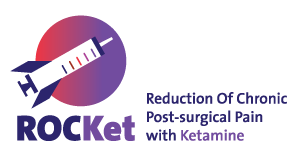
In the field of anaesthesia, consumer involvement can be a challenge. Patients are referred by surgical teams, anaesthetists are in the middle where much of their work goes unseen, and then patients go back to surgical teams for follow-up. Despite these challenges, Professor Philip Peyton, immediate past Chair of The Australian And New Zealand College of Anaesthetists Clinical Trials Network (ANZCA CTN), is dedicated to improving outcomes in surgical patients.
Prof Peyton is the Lead Investigator on the ROCKet Trial, a placebo-controlled trial of ketamine as a preventative measure for people at risk of developing chronic pain as a result of major surgery. By administering ketamine to patients before incision and up to 72 hours post-operation, Prof Peyton and his team are hoping to see a decrease in post-surgery chronic pain.

By asking patients to report their experiences of pain at 3 and 12 months after surgery, the ROCKet study will assess the effectiveness of ketamine as a preventative therapy. Ketamine as a therapy was chosen as the most appropriate due to its unique pharmacology and powerful analgesic properties.
The incidence of chronic pain after surgery is disturbingly high. And in fact, most of the pilot work ANZCA has performed suggests that the incidence of long term pain post-surgery is in the order of about 12 per cent. Some procedures often seen as fairly minor surgeries , for example, inguinal hernia repair, are notorious for this and carry a high risk of chronic pain after surgery, which is often neuropathic in nature.

The novelty of ROCKet
When conceiving the ROCKet trial, Prof Peyton identified a large proportion of patients after surgery who didn’t describe their symptoms as pain, but didn’t necessarily feel well either.
“We’re taking a different approach to this and we’re also asking people about discomfort, which is off the usual playbook. Pain is pretty well documented, but we’ve been asking people if they have pain and if they say they don’t, we then go on to ask about ongoing discomfort related to their surgery. And a surprisingly large portion have gone on to say yes.
“It’s a really rotten thing. It’s a source of great irritation and it affects patients’ lives down to things like the choice of clothing long-term, and we don’t want those outcomes for people,” said Prof Peyton.
Early data suggests that there are almost as many people reporting discomfort as there are describing pain—leading ANZCA to believe that post-surgery chronic pain and its variants are much more prevalent than previously thought.
When asked why no-one else had gone down the ‘discomfort’ line of enquiry previously, Prof Peyton described increasing understanding of the heterogeneity of the problem, particularly among pain specialists.
“Perhaps it’s an outcome that might be seen as peripheral. But I’m not sure the patients would agree with that.”
The effectiveness of trial design
Despite interruptions to recruitment thanks to COVID-19 restrictions on elective surgery, the ANZCA CTN has been pioneering a distance model of data collection for a while—the post-operation follow-up is a telephone-based system with a series of structured questionnaires.
The protocol has been designed to reflect real-world clinical practice. Feedback from the trial sites is that it’s working, it’s fitting in with routine post-op surgical management and is being delivered in an efficient way.
The trial intervention has been designed with a flexible approach; it can be modified to fit with the patient if they need to be dose-limited, or increased if they have severe pain. Flexibility is one of the strengths of the protocol—it’s designed to fit in with the patient’s needs. If the patient is experiencing adverse side effects and they need to be taken off the drug then they can do that.
What next?
Even if the intervention itself isn’t effective, the trial is expected to generate a wealth of data that will help inform clinicians and researchers about the magnitude of the problem. Once the problem is properly identified and documented, results will help to inform future studies.
“It’s nice to think that ketamine might have a positive impact on its own, but either way, I’m hoping that we can help inform future studies around the patient experience post-surgery,” Prof Peyton said.
